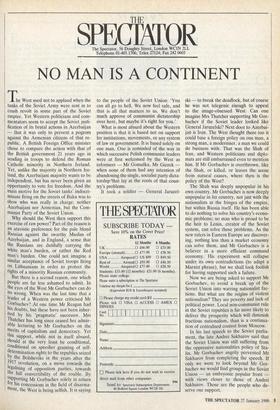SPECTAT T OR The Spectator, 56 Doughty Street, London WC1N 2LL
Telephone 01-405 1706; Telex 27124; Fax 242 0603 NO MAN IS A CONTINENT
e West used not to applaud when the
Th
tanks of the Soviet Army were sent in to crush revolt in some part of the Soviet empire. Yet Western politicians and com- mentators seem to accept the Soviet justi- fication of its brutal actions in. Azerbaijan — that it was only to prevent a pogrom against the Armenian citizens of that re- public. A British Foreign Office minister chose to compare the action with that of the British government 21 years ago in sending in troops to defend the Roman Catholic minority in Northern Ireland. Yet, unlike the majority in Northern Ire- land, the Azerbaijani majority wants to be independent, but has never been given an opportunity to vote for freedom. And the main motive for the Soviet tanks' indiscri- minate firing on the streets of Baku was to show who was really in charge; neither Azerbaijani nor Armenian, but the Com- munist Party of the Soviet Union.
Why should the West then support this exercise of raw power? Part of the reason is an atavistic preference for the pale blond Russian against the swarthy Muslim of Azerbaijan, and in England, a sense that the Russians are dutifully carrying the white man's burden, or rather the Red man's burden. One could not imagine a similar acceptance of Soviet troops firing on Lithuanians in order to protect the rights of a minority Russian community.
But there is a second reason, one which People are far less ashamed to admit. In the eyes of the West Mr Gorbachev can do no wrong. When was the last time that a leader of a Western power criticised Mr Gorbachev? At one time Mr Reagan had his doubts, but these have not been inher- ited by his 'pragmatic' successor. Mrs Thatcher has long since ceased her admir- able lecturing to Mr Gorbachev on the merits of capitalism and democracy. Yet this support, while not in itself absurd, should at the very least be conditional, Conditional on speedier granting of self- determination rights to the republics seized by the Bolsheviks in the years after the 1917 revolution, on a move towards the legalising of opposition parties, towards the full convertibility of the rouble. By supporting Mr Gorbachev solely in return for his concessions in the field of disarma- ment, the West is being selfish. It is saying
to the people of the Soviet Union: 'You can all go to hell. We now feel safe, and that is all that matters to us. We don't much approve of communist dictatorship over here, but maybe it's right for you.'
What is most absurd about the Western position is that it is based not on support for institutions, movements, or any system of law or government. It is based solely on one man, One is reminded of the way in which successive Polish communist leaders were at first welcomed by the West as reformers — Mr Gomulka, Mr Gierek when none of them had any intention of abandoning the single, socialist party dicta- torshirthat lay at the roots of that coun- try's problems.
It took a soldier — General Jaruzel-
ski — to break the deadlock, but of course he was not telegenic enough to appeal to the image-obsessed West. Can one imagine Mrs Thatcher supporting Mr Gor- bachev if the Soviet leader looked like General Jaruzelski? Next door to Azerbai- jan is Iran. The West thought there too it could base a foreign policy on one man, a strong man, a moderniser, a man we could do business with. That was the Shah of Iran, and Western politicians and diplo mats are still embarrassed even to mention him. If Mr Gorbachev is overthrown, like the Shah, or killed, or leaves the scene froin natural causes, where then is the policy of the West?
The Shah was deeply unpopular in his own country. Mr Gorbachev is now deeply unpopular in his country, not just with the nationalists at the fringes of the empire, but within Russia itself. He has been able to do nothing to solve his country's econo- mic problems; no man who is proud to be the heir to Lenin, creator of the Soviet system, can solve those problems. As the new rulers in Eastern Europe are discover- ing, nothing less than a market economy can solve them, and Mr Gorbachev is a believer in a more efficient command economy. His experiment will collapse under its own contradictions (to adapt a Marxist phrase), but we shall look foolish for having supported such a failure.
Now we are being asked to support Mr Gorbachev, to avoid a break up of the Soviet Union into warring nationalist fac- tions. But what are the origins of violent nationalism? They are poverty and lack of political power. Local non-communist rule in the Soviet republics is far more likely to deliver the prosperity which will diminish fractious nationalism, than is a continua- tion of centralised control from Moscow.
In his last speech to the Soviet parlia- ment, the late Andrei Sakharov said that the Soviet Union was still suffering from the oppressive nationalities policy of Sta- lin. Mr Gorbachev angrily prevented Mr Sakharov from completing the speech. If only we were to look beyond Mr Gor- bachev we would find groups in the Soviet Union — an embryonic popular front — with views closer to those of Andrei Sakharov. Those are the people who de- serve our support.


























































 Previous page
Previous page